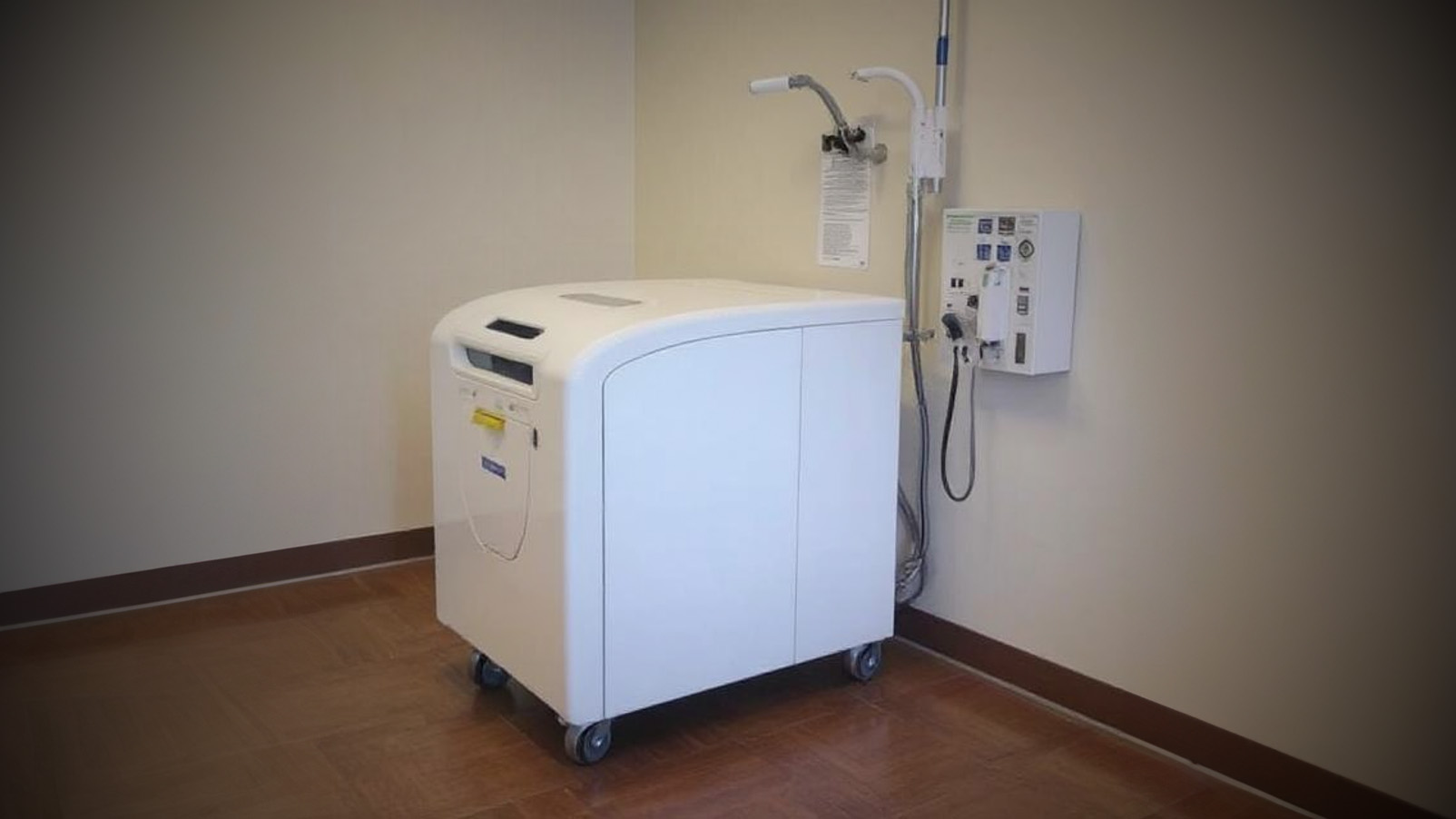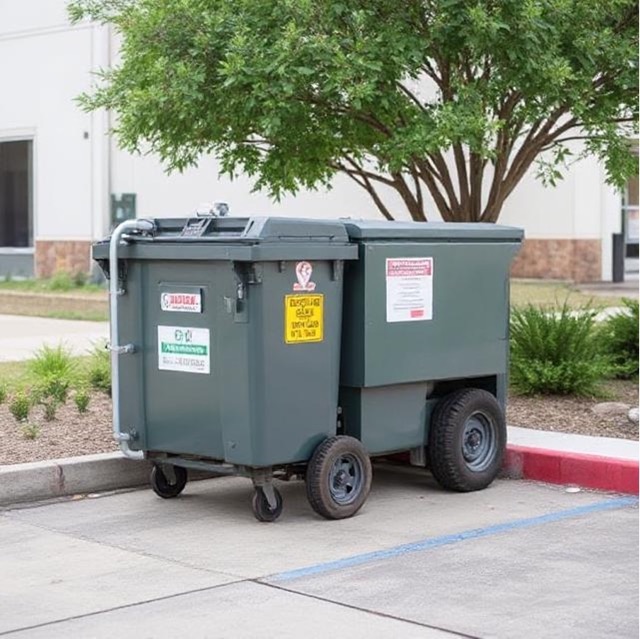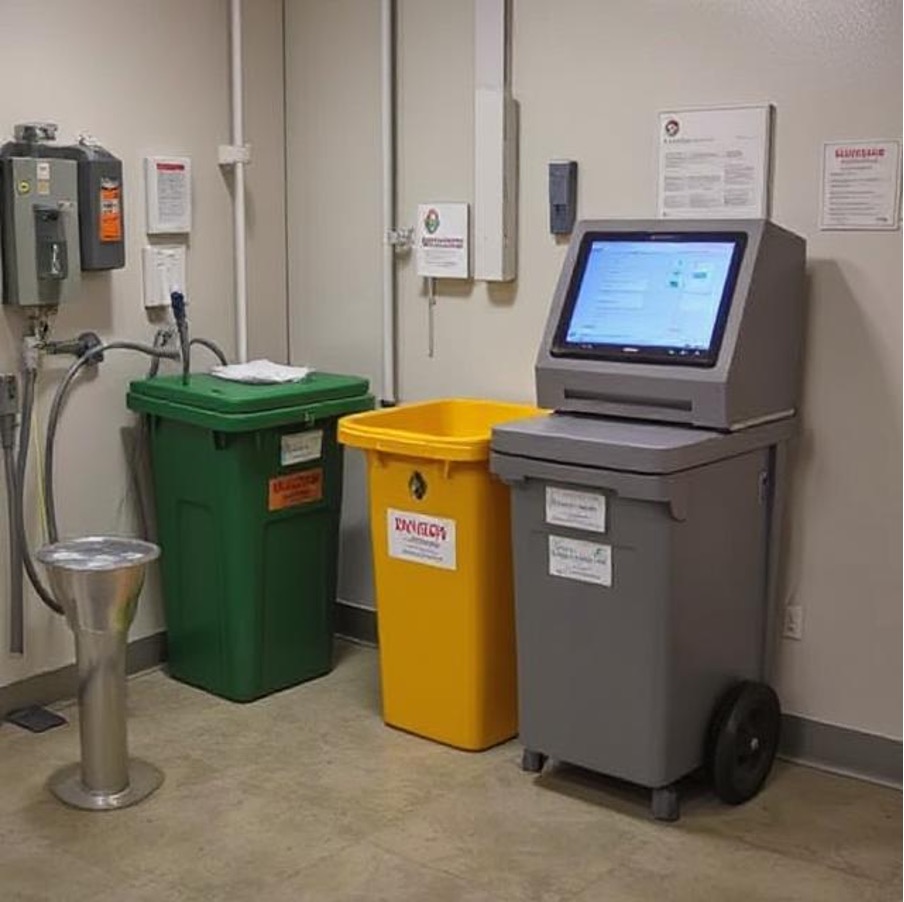Specialized Sharp Disposal for Dialysis Centers

Dialysis centers generate large amounts of medical waste, including sharps disposal materials such as needles, syringes, and blood tubing. These items are considered medical waste and must be handled with care to protect healthcare workers and ensure safe disposal. Proper waste management is essential in preventing environmental contamination, reducing public health risks, and complying with state and federal regulations.
Specialized sharp disposal for dialysis centers requires a reliable system for handling, storing, and transporting waste. Medical waste disposal services help dialysis centers comply with complex regulations while ensuring that hazardous materials are safely disposed of. Using the right medical waste containers and pharmaceutical waste containers can prevent injuries, protect both the environment and healthcare workers, and keep facilities compliant with local regulations.
Understanding Dialysis Waste Disposal
Dialysis waste disposal is a critical aspect of healthcare operations, particularly in dialysis centers where patients with kidney disease undergo treatment. The process involves the safe and regulated disposal of medical waste generated during dialysis treatment, including used dialysis equipment, contaminated supplies, and biohazardous materials.
What is Dialysis Waste Disposal?
Dialysis waste disposal refers to the collection, segregation, and proper disposal of medical waste generated during dialysis treatment. This process is crucial to prevent the spread of infections and protect healthcare workers, patients, and the environment. Dialysis waste disposal involves the handling of biohazardous materials, including blood-soaked items, used needles, and infectious waste, which requires specialized equipment and trained personnel.
Why Dialysis Centers Require Specialized Sharps Disposal
Sharps waste from dialysis procedures is classified as biohazardous medical waste due to its potential to spread infections. Improper disposal of biomedical waste can lead to serious health risks, including accidental needle sticks and exposure to hazardous materials. Safe handling of sharps disposal is necessary to prevent accidents and ensure compliance with healthcare waste disposal procedures. Medical waste management plays a crucial role in preventing health risks and ensuring compliance with legal standards.
Dialysis centers handle bulk blood and other biological waste daily, which means they must follow strict safety regulations. Medical offices, texas hospitals, and nursing homes must also adhere to waste management guidelines to prevent animal exposure, breeding places for pathogens, and environmental impact concerns. Failure to follow proper disposal methods can result in non compliance with federal regulations and state regulations.
Proper Handling and Disposal of Sharps Waste in Dialysis Centers
Handling sharps waste in dialysis centers requires strict protocols to ensure compliance with medical waste disposal regulations. These facilities must follow proper disposal methods to minimize the risk of injuries and environmental contamination. Dialysis centers generate a high volume of regulated medical waste, including used needles, tubing, and personal protective equipment. Without proper packaging and safe handling, these materials can become hazardous to both healthcare workers and the surrounding community. Proper medical waste management is crucial for ensuring compliance with legal standards and maintaining patient safety.
To safely dispose of sharps, dialysis centers should use designated sharps containers that meet regulatory requirements. These containers should be puncture-resistant, leak-proof, and labeled appropriately to prevent accidental exposure. Proper disposal procedures also include using red bag waste for non-sharp biohazardous waste, such as bulk blood and pathological waste. Following these protocols helps protect healthcare workers, ensure compliance, and maintain public health safety standards.
Compliance with Federal and State Regulations for Medical Waste Disposal
Dialysis centers must comply with both federal regulations and Texas state guidelines for medical waste management and disposal. Regulatory agencies such as the Environmental Protection Agency, Occupational Safety and Health Administration, and the Texas Commission on Environmental Quality establish strict guidelines to prevent accidents and promote staff compliance. These laws help ensure that hazardous waste from healthcare facilities is managed in a secure manner.
Compliance with waste disposal services is essential for dialysis centers, medical offices, and other healthcare facilities to avoid fines and legal penalties. Federal and local regulations require that biohazardous waste, pharmaceutical waste, and controlled substance waste be stored, transported, and disposed of according to specific safety guidelines. Working with a trusted partner for waste management ensures that facilities remain compliant with complex regulations while maintaining a cost-efficient and environmentally responsible disposal system.
Environmental Impact of Improper Sharps Disposal
Improper sharps disposal can cause serious harm to both the environment and public health. Dialysis centers generate large amounts of biohazard waste, including used needles, blood tubing, and contaminated medical supplies. If not handled correctly, these materials can lead to environmental contamination, spread infectious diseases, and create a breeding place for harmful pathogens. Effective medical waste management is crucial in preventing environmental contamination and ensuring compliance with legal standards.
Risks of Improper Sharps Disposal
- Contaminated sharps in regular trash can lead to accidental needle sticks.
- Biohazardous waste in landfills can leach hazardous materials into the soil and water supply.
- Discarding pharmaceutical waste improperly can expose the public to harmful chemicals.
- Non-compliant waste disposal can result in fines and legal penalties for healthcare facilities.
To avoid these risks, dialysis centers must follow strict medical waste disposal procedures and use designated medical waste containers. Partnering with a fully licensed waste disposal provider ensures safe handling and reduces the environmental impact of biohazardous waste.
Comprehensive Solutions for Dialysis Centers
Dialysis centers require comprehensive solutions for medical waste disposal to ensure compliance with regulations and protect the environment. Advo Medical Waste Disposal Company offers superior service with quick and prompt medical waste pickup services in Texas, guaranteeing to save customers at least 30% off their current local medical waste disposal service.
Medical Waste Disposal Services
Advo Medical Waste Disposal provides medical waste disposal services for various types of medical waste, including pathological waste, biological waste, sharps, chemotherapy waste, cultures and stocks of infectious agents, and discarded medical equipment and parts. The company’s professional and responsive service staff are highly trained and certified in handling and disposing of medical waste and sharps.
Environmental Quality and Sustainability
Advo Medical Waste Disposal is committed to environmental quality and sustainability, providing simple invoicing with no hidden fees, including no unexpected surcharges, environmental fees, or administration fees. The company is fully licensed and insured and guarantees to remain in 100% full compliance with all Texas state and federal medical waste regulations. By choosing Advo Medical Waste Disposal, dialysis centers can ensure safe and responsible waste disposal, protecting the environment and public health.
Cost-Efficient Waste Disposal Solutions for Dialysis Centers
Managing waste disposal services efficiently helps dialysis centers maintain compliance while keeping costs under control. Facilities that generate large amounts of medical waste need a system that is both reliable and cost-efficient. Effective medical waste management plays a crucial role in achieving cost efficiency and ensuring compliance with legal standards.
Strategies for Cost-Effective Waste Management
- Proper waste segregation – Separating hazardous waste from general medical waste reduces disposal costs.
- Scheduled waste pickups – Setting up routine waste collection prevents unnecessary accumulation and hidden fees.
- Use of reusable containers – Choosing durable, regulatory-compliant sharps containers lowers expenses over time.
- Employee training programs – Educating staff on proper disposal methods helps prevent accidents and ensures compliance.
- Partnering with a trusted waste provider – Working with remedi ensures safe handling and regulatory adherence.
By implementing these cost-saving measures, dialysis centers can safely dispose of medical waste while protecting healthcare workers and the environment. A well-managed waste disposal system helps facilities maintain safety regulations and reduce overall costs.
Ensuring Compliance with Federal and State Regulations

Dialysis centers must adhere to strict federal regulations and Texas state laws regarding medical waste management and disposal. Non-compliance can result in heavy fines, legal action, and risks to public health. Understanding and following regulatory requirements is crucial for ensuring safe handling and disposal of hazardous waste.
Key Regulations for Dialysis Centers
- Environmental Protection Agency (EPA) – Regulates the treatment and disposal of biohazardous waste to prevent environmental contamination.
- Occupational Safety and Health Administration (OSHA) – Requires healthcare facilities to follow strict safety regulations to protect healthcare workers from sharps injuries and exposure to hazardous materials.
- Texas Commission on Environmental Quality (TCEQ) – Oversees waste disposal services at the state level to ensure compliance with local regulations.
- Drug Enforcement Administration (DEA) – Governs the proper disposal of pharmaceutical waste to prevent drug diversion and misuse.
- Texas Department of State Health Services – Implements state regulations to prevent accidents and promote safe waste disposal practices.
Dialysis centers must work with a fully licensed waste disposal provider to ensure compliance with these regulatory agencies. By following the proper disposal procedures, healthcare facilities can prevent non-compliance issues while maintaining a safe work environment.
Choosing a Trusted Waste Disposal Partner
Dialysis centers need a waste disposal provider that offers comprehensive solutions for sharps disposal, biohazardous medical waste, and pharmaceutical waste. Working with a reliable provider like remedi ensures that medical waste is managed in a secure manner, reducing risks to healthcare workers and the environment. Additionally, the importance of medical waste management cannot be overstated when selecting a reliable waste disposal partner.

What to Look for in a Waste Disposal Provider
- Full compliance with state and federal regulations – Ensures all waste is disposed of according to legal requirements.
- Cost-efficient waste management plans – Helps dialysis centers reduce expenses without hidden fees.
- Safe transportation and handling of medical waste – Prevents environmental contamination and workplace hazards.
- Flexible scheduling options – Allows facilities to safely dispose of waste on a scheduled basis.
- Comprehensive solutions for all types of waste – Covers regulated medical waste, sharps disposal, pharmaceutical waste, and hazardous materials.
Choosing the right waste disposal services allows dialysis centers to save time, ensure compliance, and focus on patient care without worrying about complex regulations. A trusted partner can help streamline waste management while maintaining a safe and compliant facility.
Safe and Efficient Sharps Disposal for Dialysis Centers
Managing sharps disposal in dialysis centers requires careful planning, compliance with regulations, and the right waste disposal services. Proper handling of regulated medical waste protects healthcare workers, prevents environmental contamination, and ensures compliance with federal and state regulations. Effective medical waste management is crucial for ensuring safe and efficient sharps disposal.
Key Takeaways for Dialysis Centers
- Proper medical waste disposal is essential for safety and compliance.
- Sharps containers must meet regulatory requirements to prevent injuries.
- Dialysis centers must follow federal and Texas state regulations to avoid fines and legal consequences.
- Choosing a cost-efficient waste disposal provider helps facilities save time and reduce expenses.
- A trusted waste management partner ensures that hazardous waste is safely transported and properly disposed of.
Working with remedi allows dialysis centers to meet all regulatory requirements while maintaining a safe and efficient facility. Secure waste disposal solutions not only protect public health but also contribute to environmental quality by reducing biohazard waste and pharmaceutical waste contamination.
Dialysis centers need reliable waste management solutions that provide proper disposal methods, cost efficiency, and full regulatory compliance. By partnering with remedi, healthcare facilities can focus on patient care while ensuring that all hazardous waste is handled responsibly.
Contact us today to schedule sharps disposal services and maintain a safe, compliant facility.